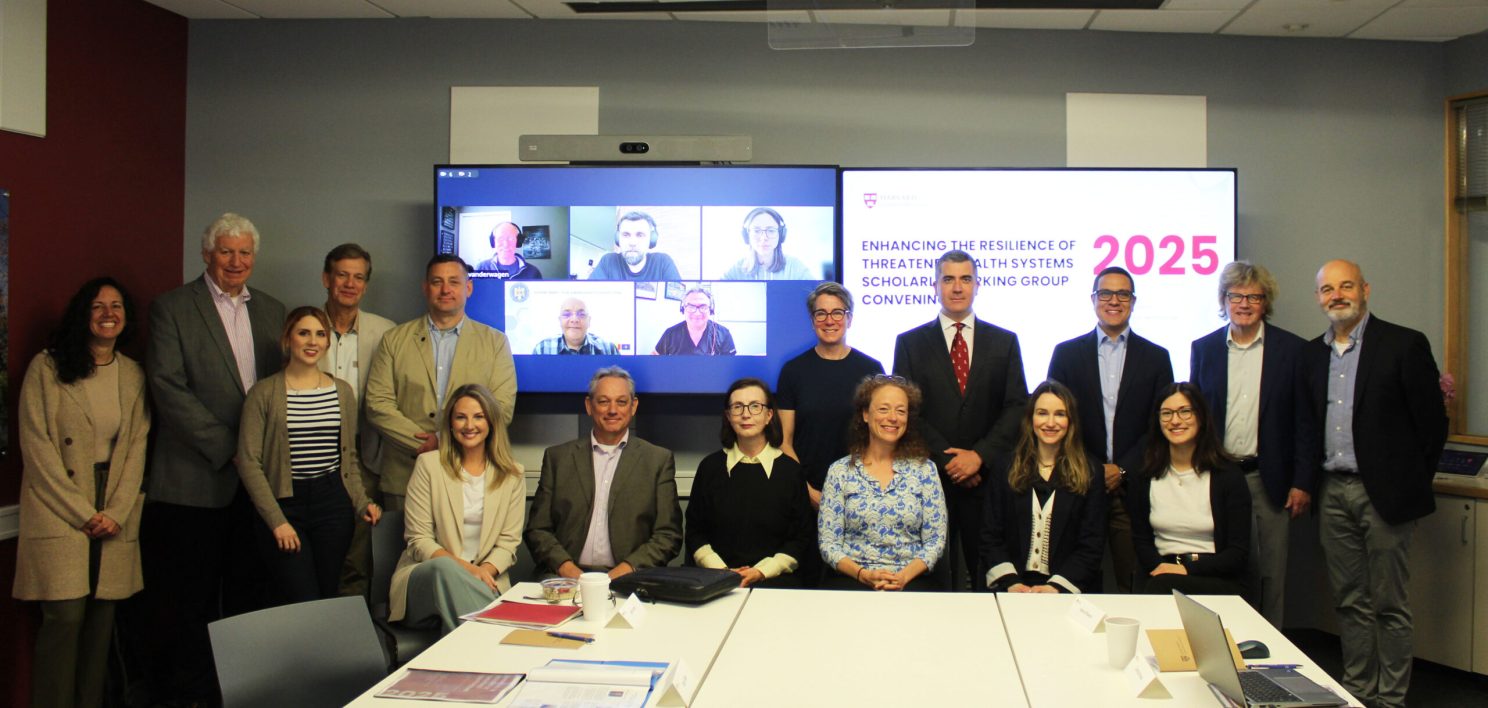Enhancing resilience of Europe’s civilian health systems as conflict with Russia escalates

Members of the Scholarly Working Group gather at the Harvard Global Health Institute to develop threat scenarios and stress-test protocols.
In response to escalating tensions between NATO and the Russian Federation, leading scholars and practitioners in global security, public health, economics, and health systems convened at the Harvard Global Health Institute (HGHI) on May 1–2 to examine strategies for enhancing the resilience of civilian health systems to disruptions resulting from armed conflict.
Organized by HGHI’s interdisciplinary Scholarly Working Group led by Margaret Bourdeaux, assistant professor at Harvard Medical School, the two-day workshop marked a critical step forward in understanding the mechanisms by which civilian health systems are disrupted by armed conflict, how vulnerabilities in health systems can be assessed, and how mitigations can be generated. Participants developed three detailed threat scenarios — cyber/hybrid warfare, invasions of NATO buffer states, and a nuclear strike — to serve as stress test models for evaluating the performance and resilience of national health systems under extreme strain. These scenarios were crafted to expose cross-sector weaknesses and threats to health systems, taking into account financial constraints, disease burdens, and population needs.
Framing the Challenge: Conflict between NATO nations and Russia
The convening commenced with presentations by leading experts on Russia-NATO relations, offering an assessment of potential ways Russia might escalate its confrontation with the West. Three key dimensions of escalation were examined: the use of kinetic force (i.e., physical military action involving weapons), the deployment of disinformation to promote Russian state narratives and sow discontent among the population toward Western leaders, and the use of cyber warfare, sabotage, or deniable low-scale attacks.
Brig. Gen. Kevin Ryan, former U.S. Defense Attaché, opened the session with an analysis of various scenarios in which Russia might seek to violate the territorial integrity of NATO member states and partner nations.
“Russia’s military thinking is ground-force centric,” he explained, “but its security rests on two pillars: conventional campaigns and nuclear deterrence.”
In addition to traditional military actions, Anita Parlow, a journalist and scholar at A.L. Parlow & Associates, LLC, suggested that hybrid warfare on Arctic communities bordering Russia and U.S. geopolitical posture were also deployed as a tactic.
Another nontraditional warfare tool is health misinformation campaigns, such as those during COVID-19, which are widely adopted to destabilize societies without direct confrontation.
“Effective disinformation campaigns don’t need to convince. Just confuse or polarize,” said Jon Roozenbeek, assistant professor in psychology and security at King’s College London. He explained that AI-generated propaganda, conspiracy messaging, and foreign-funded influence networks are now central tools of hybrid warfare.
“This isn’t ideological warfare., it’s strategic destabilization,” Roozenbeek added. “Long-term exposure is the weapon, not persuasion.”
Experts at the workshop agreed that the health consequences of modern conflicts extend far beyond battlefield casualties. It requires preparedness frameworks that account for simultaneous military, informational, and financial attacks on medical systems to address the issue.
Professor Matthew Andrews, Edward S. Mason Senior Lecturer in International Development at Harvard’s Kennedy School of Government said that systemic breakdowns in financial infrastructure — banking, contracts, and fund transfers — is one of the key health system stressors during wartime. Governments need to understand not just the availability of funds, but also the functionality of systems. Priority needs to be given to stabilizing the healthcare system and its workforce, as well as employment and tax systems.




